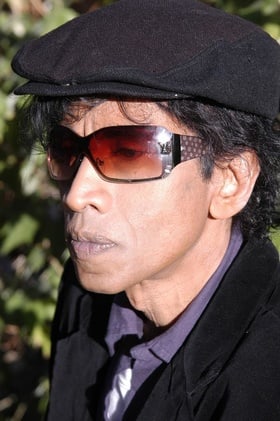Lakshminarayana Shankar (also known as L. Shankar or Shenkar) is an Indian-born American composer, violinist, and singer. Shankar was born in Madras (Tamil Nadu). Shankar grew up in Jaffna (Sri Lanka), where his father V. Lakshminarayana Iyer was a professor of the Jaffna college of music. He was exposed to Carnatic music from an early age. His father, L. Seethalakshmi, was a renowned violinist. Shankar’s five siblings were all proficient in music. L. Subramaniam, a renowned violinist, and L. Vaidyanathan (a music composer for Indian films), are his brothers. Shankar cites Tyagaraja and his family as early influences. Shankar started singing at two years old, began playing the violin at five years old, and learned to drum at seven. L. Shankar gave the first public concert at the Nallur Kandaswamy Temple, aged seven. In his youth, he gained a reputation as an accompanist for some of the most prominent names in Carnatic music, such as Chembai Vaithyanatha baghavatar, Palghat Iyer, Alathur Srinivasa and Semmangudi Srinivasa. His family fled Sri Lanka after the ethnic riots that occurred in Sri Lanka during the 1950s. After earning a Bachelor’s Degree in Physics in India in 1969, Shankar immigrated to America and worked for the next few decades to obtain a doctorate of ethnomusicology at Wesleyan University. His doctoral dissertation was entitled “The Art of Violin Accompaniment In South Indian Classical Music”. Clifford Thornton introduced him to jazz musicians Ornette Coleman and Jimmy Garrison. He also worked as a concert master and teaching assistant for the University Chamber Orchestra. Shakti was founded by Shankar and McLaughlin in 1975. It was a groundbreaking, pioneering and influential collaboration that combines east-meets west traditions. Frank Zappa produced his first solo album, Touch Me There in 1979. Shankar formed his own band, The Epidemics with Caroline in 1982. The band released three albums. In the 1980s Shankar recorded as a leader and did both jazz-based material as well Indian classical music. The unique sound of Shankar’s stereophonic, ten-string double violin, which he invented, was released on ECM’s Who’s To Know in 1980. Shankar designed and Ken Parker built this instrument. It covers all orchestral ranges, including cello, double bass, and violin. A lighter version of his instrument has been developed by him. In 1990, Shankar was co-producing a short film by H. O. Nazareth. The film went on to win the Cannes Film Festival’s Best Documentary Film award. Shankar was responsible for the music score of The Last Temptation of Christ (1988), composed by Peter Gabriel. His music ended up on both Passion: Music For The Last Temptation of Christ (Sources) and Passion: Music For The Last Temptation of Christ (Sources). In 1994, he was nominated for a Grammy because of his contribution to the film. Raga Aberi received a Grammy nomination in 1996. [3] Shankar performed on many Peter Gabriel records, including So and Us. Shankar, a fellow violinist and his niece Gingger, has been touring internationally since 1996 as “Shankar.”
